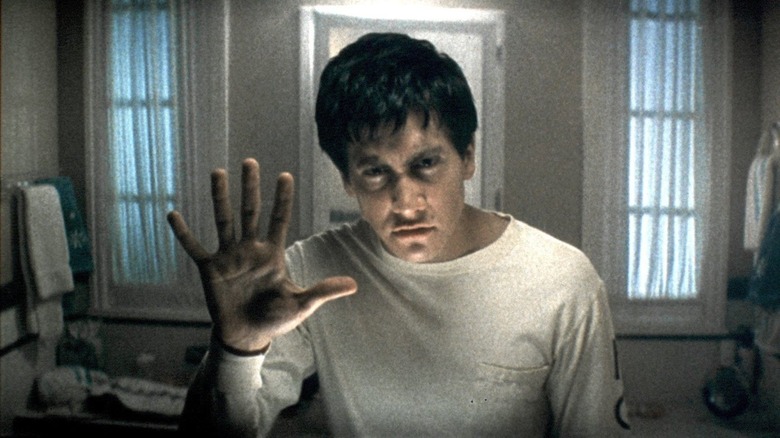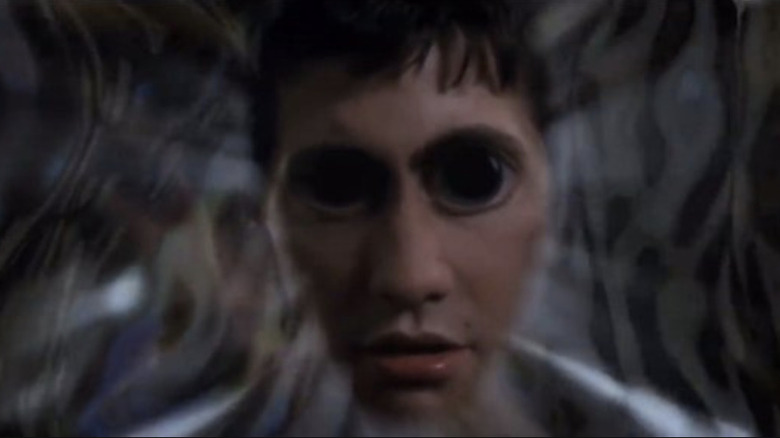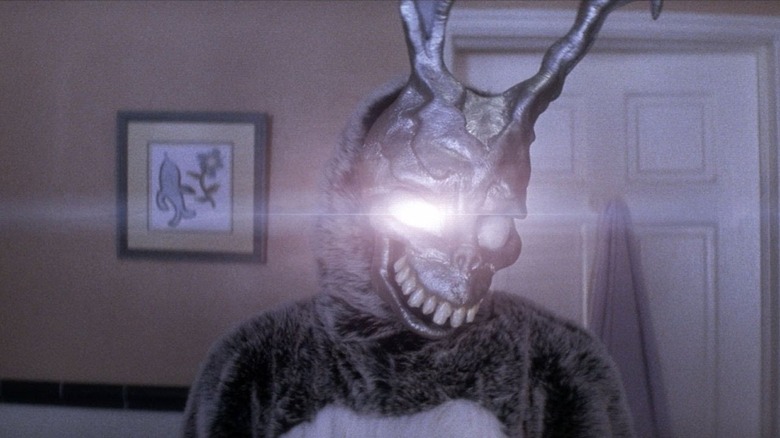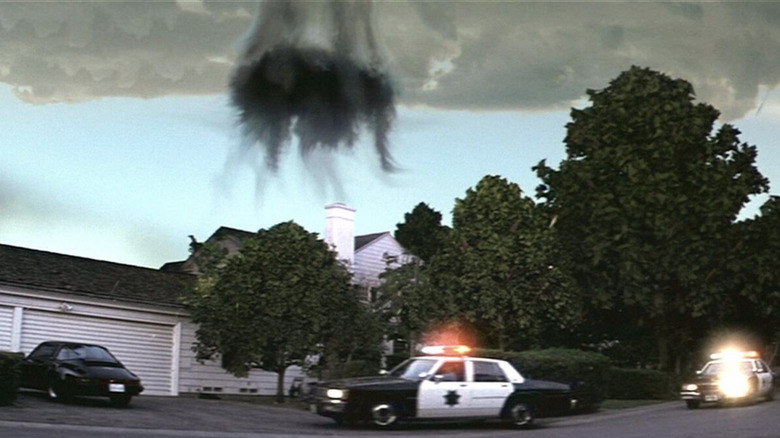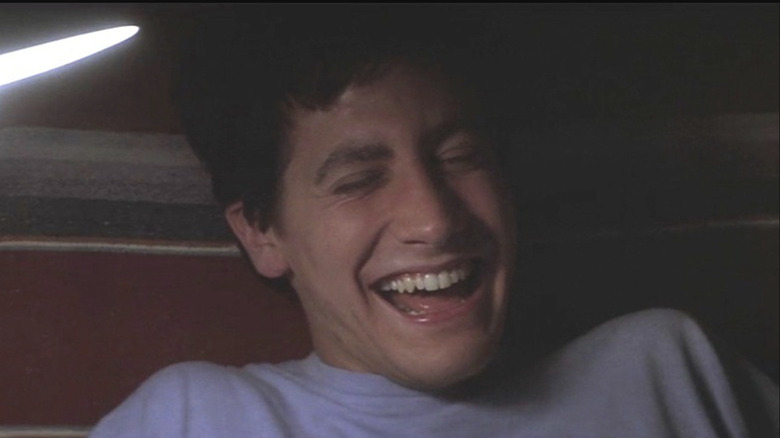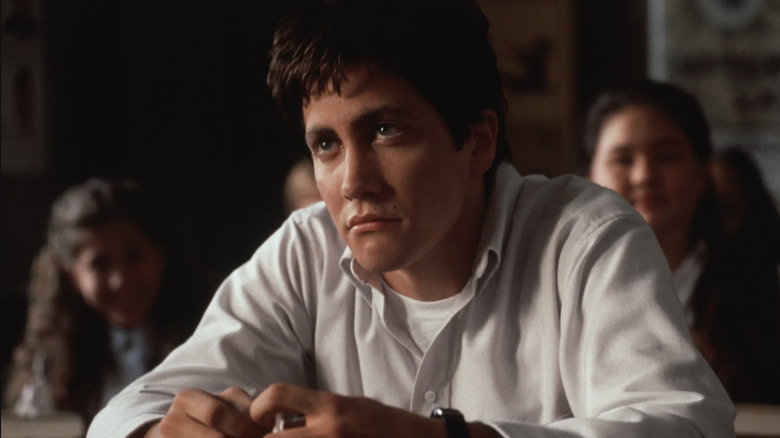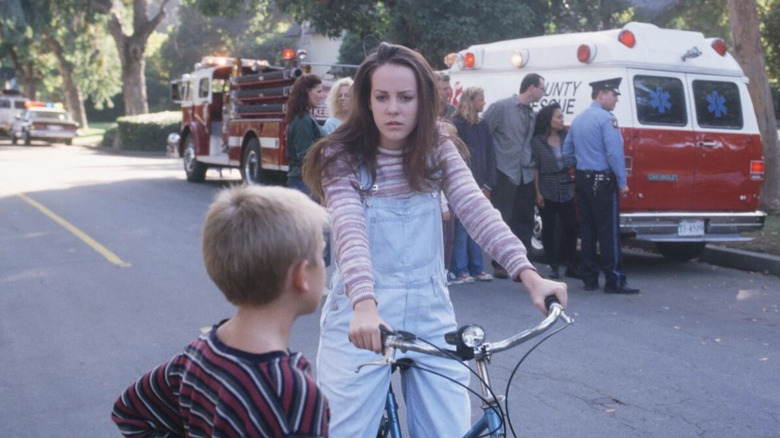Donnie Darko Ending Explained: The Power Of Selflessness
This article contains massive spoilers for "Donnie Darko."
The deepest movie anyone has seen when they're fourteen, "Donnie Darko" remains a seminal favorite after all these years. Richard Kelly's directorial debut was a darkly intellectual venture, and the science-fiction psychological thriller is still being analyzed and debated two decades later. "Donnie Darko" set the stage for Kelly's signature of complicated cerebral cinema (I'm looking at you, "Southland Tales") as well as a penchant for endings that require a hell of a lot of deciphering. It's especially interesting to try and figure out what the film is really about considering Kelly has been trying to make a sequel to the film for over a decade.
Over the years, everyone and their best friend has come up with their own interpretation of the film's ending, but we're here to break it all down for you and offer a complex dissection of what really happened to Donald J. Darko 28 days, 6 hours, 42 minutes, and 12 seconds after his fateful meeting with Frank the rabbit, and what it all means.
What you need to remember about the plot of Donnie Darko
Set in October 1988 in Middlesex, Virginia against the backdrop of the presidential election, "Donnie Darko" deals with both time travel and alternate universes (the Primary Universe is the one we exist in, while the Tangent Universe is the main alternate), so getting the story straight in a coherent manner is not the easiest thing. Bear with me, I'm going to try to make this as understandable as possible, but to do so requires jumping around in the story instead of following a linear breakdown. We're dealing with cyclical logic here, people!
Our titular protagonist (Jake Gyllenhaal) is a mouthy, moody, mentally unwell teenager struggling with sleepwalking and continually sees visions of a terrifying, human-sized rabbit he names Frank, who tells him the world is going to end. One morning, Donnie wakes up on a golf course after a night of sleepwalking to discover a jet engine crashed through his bedroom. Had he not sleepwalked, he would have been crushed to death. Over the next 28 days, he is manipulated by his visions of Frank to commit crimes, like flooding his school, but some of those crimes lead to the absolute destruction of those close to him.
His reign of terror isn't all bad, though, as one of his acts includes burning down the pedophilic motivational speaker Jim Cunningham's home, which leads to Cunningham's arrest. Unfortunately, a confrontation with his high school bullies also leads to his would-be girlfriend Gretchen's death when she is hit by a car. The driver of the car is revealed to be a man named Frank, wearing a rabbit mask. Completely beside himself, Donnie shoots Frank in the face and realizes that an injury prophesied by Frank in Donnie's nightmares is the same one that Donnie just gave him by shooting him. It's here that he realizes his nightmares have been predicting the future, Frank's prophecy of the impending end of the world comes true, and a vortex rips in the sky. Just as the plane inside the vortex begins to crash and sucks up the jet engine, the movie flashes back to the previous 28 days and Donnie awakens in his bed and is crushed by the falling jet engine.
Explaining time travel in Donnie Darko
Frank the Rabbit is warning Donnie about the existence of a Tangent Universe that he is able to see in his sleepwalking. This is a separate, alternate reality that comes to a head at the start of the film. Why does this Tangent Universe come into existence? Well, we're not given an answer on that one. Kelly deliberately leaves this a mystery because the man is not interested in spoon-feeding us baby birds any answers. During the time of the movie's release, a tie-in website included text from the character Roberta Sparrow's book "The Philosophy of Time Travel" to help explain the nature of the Tangent Universe, stating:
"If a Tangent Universe occurs it will be highly unstable, sustaining itself for no longer than several weeks. Eventually, it will collapse upon itself, forming a black hole within the Primary Universe capable of destroying all existence."
At the end of the movie, we know Donnie sacrifices himself to bring the jet engine (classified as The Artifact by Sparrow's book) from the Tangent Universe where it belongs in Donnie's original reality as Donnie is chosen as the "Living Receiver." Sparrow is implied to have also been a Living Receiver, which explains her knowledge of Primary Universes and Tangent Universes. She explains that the Living Receiver has a mission to return The Artifact. "No one knows how or why a Receiver will be chosen," says Sparrow, but it's clear that it's up to him to save the world.
Who is Frank the Rabbit and why did Donnie shoot him?
Frank first appears to Donnie on the night of October 2, as the nightmarish, humanoid rabbit who warns of an impending disaster heading to them in 28 days. Whenever Donnie sees Frank during his sleepwalking episodes, he instructs Donnie to carry out the criminal activity while constantly mentioning the impending "end of the world." During the waking hours of Halloween, when Gretchen is hit by a car, the driver is revealed to be Frank (James Duval), but he's not a demented rabbit, he's a man wearing a Halloween costume. Donnie impulsively shoots Frank in an attempt to avenge Gretchen's death, but as Frank's body lies lifeless on the road, a different Frank — the one Donnie sees while sleepwalking — appears in the bushes and watches it all play out.
As it turns out, Frank was a normal human in Middlesex, and as revealed in the director's commentary, was seeing Donnie's sister, Elizabeth (Maggie Gyllenhaal), the night of the engine crash. After being killed, he became one of the Manipulated Dead, a group of paranormal, time-traveling entities who manifest as those who died during the events of the tangent universe. He is tasked with guiding a Living Receiver on a mission to fix the rip in the timeline/universe — in this case, Donnie. After being killed on the 31st, he became the entity and traveled back in time to October 2. This is why he is shown as both a normal human and a giant rabbit.
Destruction is a form of creation in Donnie Darko
Earlier in the film, Donnie discusses the short story "The Destructors" by Graham Greene in his English class, and explains that the message of the story is that "destruction is a form of creation." By Donnie electing to destroy himself, he is able to create a new, better version of the world.
When Donnie watches the jet engine fall into the time vortex, it offers him the ability to make a different choice. He's the only one who knows what will follow if the engine crashes into the house without him in it, which includes the deaths of his family and Gretchen. He instead goes home, goes to bed, and even laughs at the absurdity of recognizing that his sacrifice will make it possible to save the lives of others. He comes face to face with the trolley problem and takes himself out of the equation.
Donnie's choice to die instead of waking up on the golf course closes the Tangent Universe and completely changes the future course for all of those he interacts with. His mother and sister on the plane won't die, because there's no more vortex. Gretchen was with Donnie when she was hit by the car, and with her no longer meeting him, her life will be spared. Frank won't die because he won't hit Gretchen with his car and spark a reactionary attack from Donnie. Jim Cunningham's house will remain intact, but considering Gretchen and Donnie's mom Rose share a knowing glance that indicates they feel as if they know one another despite not knowing how, it's implied that some remnants from the events of the Tangent Universe remain in the subconscious of the survivors. It's safe to assume someone will likely have an inkling about Cunningham's true nature, and act accordingly.
No one will ever know the truth of Donnie's selfless action, but chances are, they can sense it.
Why does Donnie laugh before he dies at the end of Donnie Darko?
Just before Donnie dies, the vortex appears over his house. This is the start of the collapse of the Tangent Universe. He drives up to a mountain and uses telekinesis to pull the duplicate jet engine off a plane, guiding it through a time portal he makes out of water. The film replays moments from the last 28 days as the Tangent Universe begins unraveling, and when it has finally collapsed, the Primary Universe has reset to exactly where it needs to be. The 28 days the audience saw have yet to happen. He wakes up in bed, laughing, having found peace with his destiny, and laughing about the absurdity of all that has happened.
The jet engine Donnie sent through the time portal now falls into his bedroom, killing him. "Well, if God controls time, then all time is pre-decided," he says earlier in the film. This was always going to be how Donnie's story ended. His laughter is one rooted in complex human emotions. As Donnie also explains earlier in the film to a teacher who tries to force everything into a binary of "love" or "fear," it's not that simple. All of Donnie's stated belief systems (that also frequently got him into trouble) have proven to be coming full circle. There's also a theory that he doesn't actually die (boosted by Kelly's desire to make a sequel), with many believing the laughter is Donnie accepting that he'll return at some point.
Did Donnie Darko have to die?
It's assumed that Donnie has to die to prevent the Tangent Universe from restarting, but many theorize that his death isn't actually necessary. By expunging the Artifact (in this case, a duplicate jet engine through the water portal), per "The Philosophy of Time Travel," he successfully fixed the problem. It's also assumed that Roberta Sparrow was a Receiver herself, and she didn't die either. However, as an agnostic, Donnie does believe in the possibility of God and seems to have sacrificed himself in a Christlike manner to better the lives of everyone in his orbit. Going back to the idea of time being pre-decided, if Donnie continued to live, his mother and sister would die in a plane crash — a butterfly effect result of Cunningham's exposure from Donnie's arson — and Gretchen and Frank would still die the way Donnie witnessed firsthand.
So Donnie stays in bed, knowing the jet engine will crash on top of him, sacrificing himself for what he views as the betterment of the rest of the world. Donnie didn't need to die to fix the timeline of the universe, but in his mind, he did need to die to save everyone else.
At the same time, we know that Donnie was deeply mentally unwell before the timeline chaos began, so Donnie sacrificing himself could also be the result of his mental illness. Hell, the entire movie could be a result of his mental illness, but that's not nearly as fun or interesting of an interpretation.
What happens to the other characters in Donnie Darko, according to the director
As Gary Jules' cover of "Mad World" by Tears for Fears plays over a montage of the aftermath of Donnie's death, all of the people who would have been dramatically impacted by Donnie in some way/shape/form over the next 28 days seemingly have a connection to his passing, despite the future events no longer taking place. The final chapter of "The Philosophy of Time Travel" is a bit ambiguous about how it all works out, but indicates that the Manipulated Living (as opposed to the Manipulated Dead, like Frank) will be subconsciously haunted by their experiences from the Tangent Universe. Donnie's death prevented them from experiencing the events of the Tangent Universe precisely as planned, but remnants remain.
Jim Cunningham eventually dies by suicide due to the overwhelming guilt of his crimes. Donnie's mother Rose and Gretchen wave at one another the morning of Donnie's death despite having not yet "met" one another in this new timeline — a remnant of their connection to him in the Tangent Universe. On the DVD commentary of the film's director's cut, Richard Kelly explained that even Frank honking the horn when he drops off Elizabeth is a result of that subconscious haunting. As he explained, "I think part of the reason he is honking his horn there is he is overcome by this feeling of déjà vu, where he realizes that, as all the other characters, they lived in some place, some other dimension, for a brief time and its memories are there but they're sort of drifting away." We've also done a complete breakdown of the director's cut compared to the theatrical cut if you're looking for even more theorizing.
Over the years, Kelly has also given more concrete answers (via NME), taking the stance that "I look at the events in the film as a story of divine and supernatural intervention, where a select group of characters happen to be living in the proximity of this science fiction event." However, he still believes that "Donnie Darko" is best when left open to interpretation. "That is not to take away any interpretation that people have of the film, which I think is valid because the way it's engineered, you can have any interpretation you want of the first 90% of the movie."
So what does it all mean? It's all a matter of philosophy.

